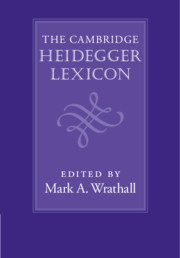Book contents
- The Cambridge Heidegger Lexicon
- Series page
- The Cambridge Heidegger Lexicon
- Copyright page
- Contents
- Contributors
- Preface
- Acknowledgments
- Using the Lexicon
- Chronology of Martin Heidegger
- Abbreviations for Heidegger’s Works
- A
- B
- C
- D
- E
- F
- G
- H
- I
- J
- K
- L
- M
- N
- O
- P
- 152. People (Volk)
- 153. Perception (Wahrnehmung)
- 154. Phenomenology (Phänomenologie)
- 155. Place (Ort/Ortschaft)
- 156. Playing Forth (Zuspiel)
- 157. Poetry (Dichtung)
- 158. Poiêsis
- 159. Polemos
- 160. Possibility (Möglichkeit)
- 161. Power (Macht)
- 162. Presencing (Anwesen)
- 163. Prevailing (Walten)
- 164. Principle (Satz)
- 165. Proximally and For the Most Part (Zunächst und zumeist)
- 166. Publicness (Öffentlichkeit)
- R
- S
- T
- U
- V
- W
- German–English Glossary
- Bibliography
- Index
154. - Phenomenology (Phänomenologie)
from P
Published online by Cambridge University Press: 17 April 2021
- The Cambridge Heidegger Lexicon
- Series page
- The Cambridge Heidegger Lexicon
- Copyright page
- Contents
- Contributors
- Preface
- Acknowledgments
- Using the Lexicon
- Chronology of Martin Heidegger
- Abbreviations for Heidegger’s Works
- A
- B
- C
- D
- E
- F
- G
- H
- I
- J
- K
- L
- M
- N
- O
- P
- 152. People (Volk)
- 153. Perception (Wahrnehmung)
- 154. Phenomenology (Phänomenologie)
- 155. Place (Ort/Ortschaft)
- 156. Playing Forth (Zuspiel)
- 157. Poetry (Dichtung)
- 158. Poiêsis
- 159. Polemos
- 160. Possibility (Möglichkeit)
- 161. Power (Macht)
- 162. Presencing (Anwesen)
- 163. Prevailing (Walten)
- 164. Principle (Satz)
- 165. Proximally and For the Most Part (Zunächst und zumeist)
- 166. Publicness (Öffentlichkeit)
- R
- S
- T
- U
- V
- W
- German–English Glossary
- Bibliography
- Index
Summary
Phenomenology is a branch of philosophical research founded and established by Edmund Husserl in the beginning of the twentieth century. The characteristic traits of the phenomenological movement can be found in the slogan “Back to the things themselves!” This slogan combines three tendencies: (1) a thorough affirmation of what actually needs to be considered – the character and structure of our actual engagement with the world around us (thus many of the preoccupations are exposed as pseudo-problems); (2) a turning away from history-bound and thus tradition- or school-dependent philosophizing (e.g., neo-Kantianism); and (3) an anti-reductionism that defends the rehabilitation of the entirety of humanagainst scientific reductionism.
- Type
- Chapter
- Information
- The Cambridge Heidegger Lexicon , pp. 574 - 577Publisher: Cambridge University PressPrint publication year: 2021

